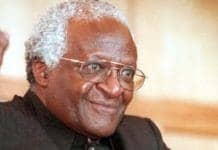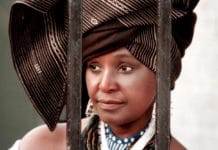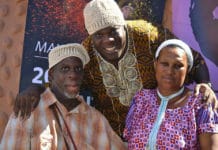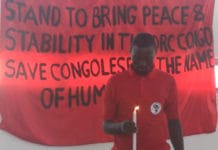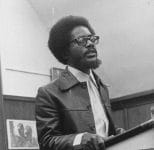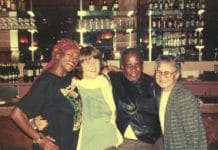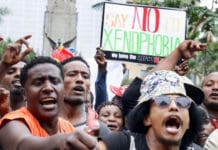by Mnikelo Ndabankulu, Ndabo Mzimela and S’bu Zikode for Abahlali baseMjondolo
“If the ANC does to you what the Apartheid government did to you, then you must do to the ANC what you did to the Apartheid government.” – Nelson Mandela, Cosatu Conference, 1993
On Monday, Abahlali held a protest in Cato Crest in honor of the late Tata Nelson Mandela.
On Saturday, Abahlali baseMjondolo had met to discuss the meaning of Nelson Mandela for our country and our struggle and to discuss how we can honor him.

Today we are evicted in Cato Crest. Today we are beaten, arrested, shot and murdered in Cato Crest. Today we do not count to the law in Cato Crest.
It is not just our movement that is placed beneath the law today. The violation of the Constitutional Court in the case of the street traders in Johannesburg and the arrest of the Socio-Economic Rights Institute lawyer Nomzamo Zondo shows how everywhere the poor, and those who stand with us, are coming under attack.
Mandela stood for one nation. Today the political leaders in Durban say that the reason they can’t house the people is because people from the Eastern Cape are coming to Durban. They say that some of our neighbors and comrades must “go back to Lusikisiki.”
Mandela announced that there would be homes for all. Today there is only housing for ANC members.
The struggle we are facing today we were facing it even when Mandela was still alive. The evictions, beatings, arrests, torture, assassinations, corruption and violation of our rights were taking place when Mandela was still alive even though in the absence of his presidency.
Nelson Mandela fought for justice, democracy and freedom for all. He did not say that the poor were excluded. He did not say that people from some provinces were excluded.
We remain committed to the vision of justice, democracy and freedom for all. We will continue to take Mandela’s struggle forward.
Mandela went to jail saying that he stood for a “revolutionary democracy in which poverty, want and insecurity shall be no more.” The struggle for a revolutionary democracy, a democracy in which every person counts, continues.
Today we are experiencing different leaders. Today we are experiencing leaders who are Black Boers. They are leaders that evict us, beat us, torture us, arrest us and kill us.
The ruling party is fighting for membership and the sustainability of the party rather than addressing the peoples’ concerns and challenges. Today people do not volunteer for the party because they want to join the struggle for justice, equality and democracy. Today people join the party to invest in the party so that tomorrow it will be their turn to eat our future.
We recognize the party of Mandela as the Khongolose (Congress of the People). Many of our members remain loyal to the Khongolose. But today we are led by the ANC and not by the Khongolose.
Today people join the party to invest in the party so that tomorrow it will be their turn to eat our future.
Today, as Mandela has passed on, the ANC is an organization that has harmed us and that will continue to harm us. But Mandela lived for us and not for the ANC. He clearly said that if the ANC does to us what the apartheid government did to us then we must not fear to do to the ANC what we did to the apartheid government. Nobody can deny that in Cato Crest the ANC is doing to us what the apartheid government did to us.
Madiba always made it clear that there is still a long walk to freedom. He said this again and again, including on the day that he stepped down as the president. It is true there is still a long journey ahead of us to freedom. It is the responsibility of our generation to continue this journey.
Today, as Mandela has passed on, the ANC is an organization that has harmed us and that will continue to harm us. But Mandela lived for us and not for the ANC.
We will not waste our time with unprogressive round table discussions that are only designed to take us out of communities and off the streets. We will not waste our time with national speeches which only offer us words. Hope comes through action. When there is no progressive action from the government, we will take our own action. Mandela said, “Our march to freedom is irreversible.” We shall march until we reach our freedom.
Mandela sacrificed his children, his life and his family for the struggle and for us to be free. We shall continue with his sacrifice for justice.
We will honor Mandela and have our own memorial service in honoring Mandela. Today we honor Nelson Mandela by marching on the ANC because the ANC of 2013 is not Khongolose. It is very different from Mandela’s ANC. In fact the ANC of 2013 are our oppressors.
Today we protest to demand land and housing and an end to corruption and repression, including assassination. This is how we will show our respect for Mandela’s struggle. We are continuing where Mandela left off. This new phase of the struggle is just beginning.
Monday’s protest began at 9 a.m. at the Cato Crest sport ground and proceeded to the Cato Manor Police Station, where our memorandum will be handed over to MEC Ravi Pillay, MEC Nomusa Dube and Minister Nathi Mthethwa. [MEC stands for member of the Executive Council, the cabinet of a South African province.]
We are continuing where Mandela left off.
Bandile Mdlalose will not be at today’s protest as her bail conditions have banned her from Cato Crest, while those that have evicted us, beaten us, shot us and murdered Nqobile Nzuza are free to continue their oppression in Cato Crest.
Abahlali baseMjondolo (Shack Dwellers Union) is the largest social movement of the poor in post-apartheid South Africa. To learn more, visit http://www.abahlali.org, where this story first appeared.
Nelson Mandela’s long walk to freedom has come to an end
by Bandile Mdlalose
Our hero, the light of the nation, the father of all who feared nothing when it came to his children has now left us in pain. Our tears flow. Nelson Mandela’s long walk to freedom has now come to an end.

The Black Boers have privatized the people’s struggle and they have turned our country into their own personal ATM. The times where English and roundtables can take this country further have gone. Protocols have bought us nothing but shame. The Black Boers have made their intensions clear. They will ignore the courts and they will beat, arrest, torture and kill us so that they can keep filling their pockets.
We need to fasten our takkies as the new era of oppression is just beginning. They have already killed us in the Free State, in Marikana and in Cato Crest just as the generation of 1976 was killed.
They kill us because they fear us. They fear us because we are the living truth of their betrayal. They fear us because we do not accept their lies. They fear us because we know our own power. They fear us because we have seen how they killed Andries Tatane, the Marikana Miners, Thembinkosi Qumbela, Nkululeko Gwala and Nqobile Nzuza – and yet we refuse to be intimidated and we continue to occupy land and to go to the streets.
The Black Boers have privatized the people’s struggle and they have turned our country into their own personal ATM.
To hell with protocol. The only way for our generation to fulfill Mandela’s dream is to take power into our own hands. Together we must turn this country into a revolutionary democracy.
Mandela once said that if the ANC does to this country what the apartheid government did, the people must not fear to do what the ANC did to the apartheid government. This country was not given to ANC by votes. Voting was a bonus, but it was fought for very hard. There was a huge struggle from below. There was bloodshed and arrests. We do not believe that voting will win us our freedom. We will win our freedom when we as the poor build our power from below in struggle, when we build a revolutionary democracy from below.
The only way for our generation to fulfill Mandela’s dream is to take power into our own hands. Together we must turn this country into a revolutionary democracy.
The way to go is for us to unite and put on our takkies and go to streets. That is how we will show out loyalty to the Hero Nelson Mandela.
Lala Ngokuthulala baba ube yiqhawe kithi. We shall continue where you left off.
The struggle is just beginning.
Bandile Mdlalose, 27, is the secretary general of Abahlali baseMjondolo, the South African Shackdwellers’ Movement, on whose website this story first appeared. A Dec. 6 Esquire story, “Letter from South Africa: The fight for what Mandela promised,” reports that after a recent seven-day incarceration, Bandile said, “I had a lot of time to think in prison, and I felt that I haven’t done enough.” Now in hiding from hit men who are threatening to kill her and her children, she added: “I know I might be killed. Before the bullet hits, I must know that I’ve given 100 percent.” The story concludes, “Mandela would be proud.”
http://youtu.be/yXxsdrAgYfo
In his first television interview in 1961 when he was 43 years old, a young Nelson Mandela fleshes out his strategy for reclaiming fundamental rights for Black South Africans from his hideout before his arrest.

 Store
Store



